2025 Inductees
2025 Scholars

Lauryn is a Ph.D. candidate in the Genetics and Molecular Biology program at Emory University. Her research focuses on understanding the role of ribosomal RNA (rRNA) modifications in the regulation of translation initiation. Within her first two years at Emory, Lauryn has contributed to two manuscripts as a co-author and has been awarded the Centennial Scholar Award from Laney Graduate School, NIH T32 pre-doctoral award, and the NIH Ruth L. Kirschstein-NRSA Individual Predoctoral Fellowship.
In 2021, Lauryn earned a B.S. in Biochemistry from the University of Missouri, where she was also recognized for her leadership, service, and academic excellence through the Mizzou ’39 Award. Following graduation, she worked as a post-baccalaureate research fellow in Biology at Indiana University-Purdue University Indianapolis through the NIH- Post-Baccalaureate Research Program (IPREP).
In addition to her research, Lauryn is passionate about serving in leadership roles that contribute to diversity and inclusion by serving as the President of the Black Graduate Student Association and by being an active member of the GA RNA Salon organizing committee. Ultimately, Lauryn aspires to become a scientific leader, applying her expertise in biochemistry and genetics to make science more accessible to others.
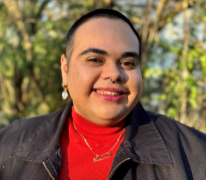
Yesenia Garcia-Sifuentes is a Neuroscience Ph.D. candidate at Emory University. Their research focuses on understanding the developmental determinants of social value-based decision-making in brain regions such as the basolateral amygdala. They have also researched how sex differences are reported and misreported across the biological sciences. Yesenia received their B.A. in Neuroscience and a minor in Race and Ethnicity from Vassar College. Upon admission to Emory, Yesenia was awarded the Centennial Scholars Fellowship based on their outstanding academic achievement and their promise as a leader.
Yesenia has received numerous accolades while at Emory, including the HHMI Gilliam Fellowship, the Emory Neuroscience Program Scientific Outreach Award, and was named a Neuroscience Scholar on behalf of the Society for Neuroscience. Yesenia is an enthusiastic advocate for underrepresented groups and has dedicated many efforts towards increasing inclusivity in STEM. Early in their graduate career, Yesenia recognized the need for broader representation in the sciences and created a blog called “NonbinaryNeuro” to foster community by sharing the unique experience of navigating graduate school while holding intersecting identities, such as being transgender, queer, and Latinx. Due to the success of their blog, Yesenia has been invited to speak and share their journey as a DEI expert and keynote speaker at various scientific conferences and universities across North America. Additionally, they have volunteered with Cientifico Latino’s Graduate School Mentorship Initiative to increase access to graduate programs. Through their visibility and mentorship, Yesenia hopes to empower and support fellow students in STEM who have been historically excluded, marginalized, or oppressed.

Leah A. Kaplan is a PhD candidate in Philosophy at Emory University. Leah holds an M.A. in African American Studies from Northwestern University and an M.A. in Philosophy and Art from Stony Brook University. Her research traces the continuity between slavery and contemporary tourism in the Anglophone Caribbean and specifically looks at the ways in which tourism reproduces the position of servitude for the black subject and the position of mastery for the white subject. Her claim is that Caribbean tourism is undergirded by a logic of unconditional hospitality that expands the freedoms of the tourist by making them feel “at home” wherever they are, making clear that tourism is yet another example of the afterlives of slavery, characterized by white self-discovery and sovereignty through the subjugation of blackness.
Kaplan is the winner of the Dean’s Teaching Fellowship, the Robert W. Woodruff Fellowship, and the Centennial Scholarship. She is a former co-liaison for the Emory chapter of Minorities and Philosophy, where she seeks to foster underrepresented voices and marginalized identities within the academy.
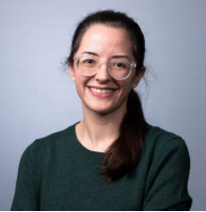
Ariana Mora is a medical student and Ph.D. Candidate in Epidemiology at Emory University. Her research and clinical work are focused on understanding and addressing the sequelae of healthcare deprivation and improving healthcare access. Ariana is a Robert Wood Johnson Foundation (RWJF) Health Policy Research Scholar (HPRS) and received the HPRS Dissertation Award for her dissertation entitled, “Leveraging Disease Misclassification to Estimate the Impact of Pre-Pregnancy Healthcare Access on Maternal Morbidity.”
In addition to her dissertation work, Ariana has been collaborating with CDC National Center for Chronic Disease Prevention and Health Promotion, Division of Reproductive Health, to develop the Policy Recommendation Toolkit for Maternal Mortality Prevention. She has been a Visiting Research Internship Program (VRIP) Scholar at Harvard Medical School and received the Hubert W. Lamb Prize, Jerome A. Schiff Fellowship, and Global Engagement Fellowship during her undergraduate degree at Wellesley College. She strongly believes in the power of community and recognizes her success has been possible through the support and care she has received from those around her.
Ariana plans to pursue an academic career as a physician scientist, continuing her multifaceted approach for change through her research and public health interventions to promote health equity, helping the communities around her through political advocacy and medical care, and fostering a new generation of learners by paying forward the culture of support and care that has been extended to her.
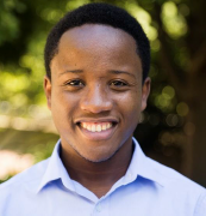
Rene K. Odanga is a candidate for the Ph.D. in History at Emory University with a focus on African history. His research focuses on the expansion of the British Empire and the consolidation of colonial control in East Africa in the nineteenth and twentieth century through contexts of slavery and abolition, colonial violence and dispossession and inequality. Rene’s research and scholarship outside the United States has been supported by the Department of History, and he was a recipient of the Halle Institute Graduate Global Research Fellowship. He earned a Master of Arts in African Studies and Research from Howard University and a Bachelor of Arts in International Relations from the United States International University-Africa in Nairobi, Kenya.
Rene strongly believes in the transformative power of higher education and actively works in graduate school recruitment at the Laney Graduate School where he is an Emory Diversifying Graduate Education (EDGE) fellow. He hopes to work enter the academic profession teaching and researching in African history and the humanities and helping others unlock new ways of understanding the world through a liberal arts education.
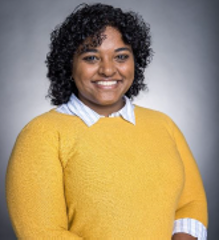
Michaela Philip is a PhD student in the Economics department at Emory University. Her research focuses on the modern and historical urban policies that create and perpetuate health and economic inequality in the United States. She received her Bachelor of Science in Public Health from the University of Alabama at Birmingham, where she was the recipient of the University Honors Program's Student Service Award.
Michaela works as an Emory Diversifying Graduate Education (EDGE) Ambassador, where she assists with events geared at recruiting and supporting diverse scholars. She has also worked as a Summer Opportunity for Academic Research (SOAR) instructor where she taught fundamentals of the research process to students from various fields and universities. Michaela is passionate about growing the field of economics and hopes to continue teaching and researching through a career in academia.

Christina C. Ramelow is a candidate for the Ph.D. in neuroscience at Emory University. Her research is focused on developing new methods to quantify RNA and protein levels from neural cell types and investigating astrocytic contributions to Alzheimer’s disease pathogenesis. Christina has presented her findings at numerous scientific meetings, many of which she received travel scholarships and poster awards, co-authored 3 peer-reviewed manuscripts, and was awarded an NRSA F31 fellowship.
At Emory, she has been an active member of the Initiative for Maximizing Student Development community as an alumna of the program and as a current graduate teaching assistant. Prior to Emory, she received a Bachelor and Master of Science in Biology from Eastern Washington University, where she participated in the Ronald E. McNair Scholars and NSF S-STEM Scholars Programs and found her passion for biomedical research, teaching, and mentoring. She has served in many teaching, leadership and service roles focused on community engagement, STEM education, mentorship and supporting underrepresented students. Christina aspires to be a university professor where she can conduct research in glial biology and neuroimmunology, teach in the biomedical sciences, and mentor students inside and outside of the lab.
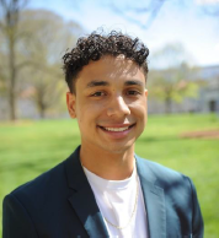
Kevin D. Russell is a candidate for the Ph.D. in Political Science with a concentration in U.S. politics at Emory University. His research focuses on the behavior of individuals in campaign finance with respect to racial identity. Kevin has been recognized as a Centennial Scholar, a Fellow in the American Political Science Association’s Diversity Fellowship Program, and a Junior Fellow with Emory Diversifying Graduate Education. He received a Bachelor of Arts in Political Science and minor in African American Studies from Northwestern University, where he received the Political Science Department’s Certificate of Achievement in Quantitative Skills, the Northwestern Scholarship, the Posner Summer Fellowship, and the Northwestern Summer Internship Grant.
Kevin possesses a hunger for knowledge and believes in empowering others through teaching and community engagement. He serves as a volunteer mentor with Evanston Scholars, an organization geared toward preparing promising high school students from under-represented backgrounds to attend and graduate from college. Ultimately, Kevin aspires to research and teach politics at the university level and to disseminate knowledge to subsequent generations.

Ekram M. Towsif is a Ph.D. candidate in the Physics program with a concentration in Biophysics at Emory University. As the first in his family to earn a bachelor’s degree in physics and molecular biology/biochemistry from Wesleyan University, Ekram's journey has been driven by a commitment to both academic excellence and service. At Wesleyan, he was a member of the university honor and community standards boards. He was honored as a QuestBridge Scholar, Ronald E. McNair Fellow, presentation award at the SACNAS conference, and received the Scott Biomedical Prize for his contributions to research.
At Emory, Ekram continues his passion for research, using his background in physics and biochemistry to explore novel mechanisms in actin cytoskeleton dynamics. His work has been published in the European Journal of Cell Biology, the Proceedings of the National Academy of Sciences (PNAS), and has been featured in The Scientist magazine. His research has also earned him an honorable mention for the NSF Graduate Research Fellowship Program. Beyond his academic pursuits, Ekram is deeply committed to fostering diversity in science. He actively mentors underrepresented, first-generation, and low-income students through his volunteer work with QuestBridge, SACNAS, McNair, and the Discovery Museum. He also contributes to the Emory community through his involvement with Emory Libraries at ECDS and LSD. Ekram aspires to combine his love for science and education as a director at the Discovery Museum and Planetarium, where he hopes to inspire future generations of young scientists and advocate for accessible STEM education.

Kaylin M. White is a Ph.D. candidate in epidemiology at Emory University. She earned a B.S. from Spelman College and an M.S. from the University of Michigan. Her research examines racial disparities in sleep and how social adversity, including chronic stress and discrimination, contributes to these differences. She also investigates how inadequate sleep may accelerate biological aging, exacerbating health disparities. As a National Institutes of Health (NIH) T32 M.E.T.R.I.C. predoctoral fellow, Kaylin has authored a book chapter in the upcoming Cambridge Handbook of Sleep Theories and Models, assessed measurement bias in sleep duration among adolescents, published on sleep disturbances and adverse perinatal outcomes among Black pregnant women, and conducted systematic and narrative literature reviews on the social determinants of sleep disparities.
Kaylin is committed to service and advocacy. As a fellow at the Centers for Disease Control and Prevention (CDC), she led the development of the Social Vulnerability Index (SVI) Academic Toolkit, expanding access to geospatial health equity research tools for students, particularly at Historically Black Colleges and Universities (HBCUs). She also mentors emerging STEM scholars by volunteering at Spelman College Research Day. Her contributions have been recognized by the Achievement Rewards for College Scientists (ARCS) Foundation Scholarship and the Agency for Toxic Substances and Disease Registry (ATSDR) Honor Award for Excellence in Program Delivery for Health Equity at CDC. Through scholarship, service, and advocacy, she aims to translate research into public health interventions that promote resilience and advance health equity.